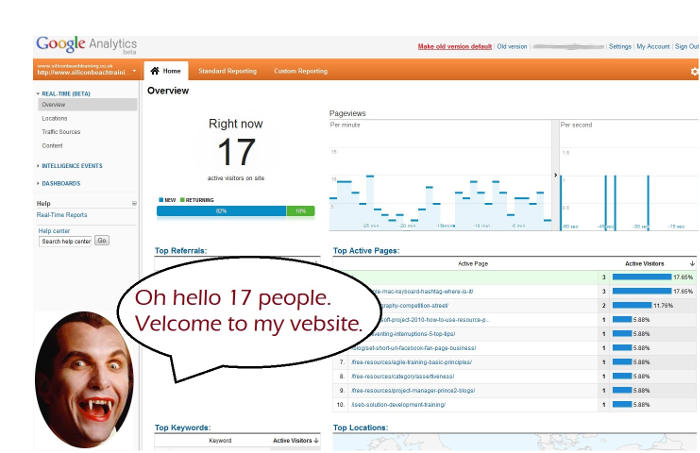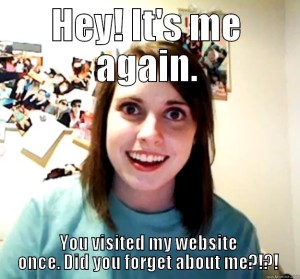I love Halloween for three reasons: candy, costumes, and television specials. So, with the approaching holiday in mind, I thought it may be timely to follow the Treehouse of Horror motif and explore the spookier aspects of online marketing. After digging deep beneath Google’s multicolored surface, I chose to shed some light on 4 Google tools that may creep out the average Internet surfer but can greatly benefit your hotel’s online marketing strategy.
Google Adwords Remarketing
Have you ever wondered why Google keeps insisting you’re looking for single Jewish girls in your area? Or why a display ad featuring those Nike running shoes that you put in your online shopping cart and never purchased is repeatedly showing up on every website? You were most likely another target of Google Adword’s remarketing. This Adwords feature helps businesses serve extremely targeted ads to people who have previously visited their sites. The ads pull images or text that is relevant to particular individuals. For example, let’s say you read a review about a Hilton hotel in Chicago while on Expedia. You might then begin to see Expedia ads featuring the exact same Hilton hotel on Google’s search engine results or on various websites that are part of Google’s search network partners.
How To Use It:
First, you need to add remarketing tags to all the pages of your hotel’s website. When people visit that site but don’t complete a specified conversion in a certain time period, they will be added to a list. The lists are just collections of cookies from the people that have visited your site. Though the marketers cannot see what IP address those cookies are from, Google can, and Google uses that information to send remarketing ads. The users on these remarketing lists will begin to see ads from the previously visited site through Google Display or Google Search networks until they do make a conversion within a given amount of time or exposures. It is important to create a separate ad group just for these remarketed potential customers to show them a specially tailored message.
Why Is It Creepy?
There is a fine line separating persistence from creepiness. Just like the weird guy that keeps insisting that you need to hang out, remarketing a message too many times can cause user aversion.
Why Is It Helpful?
While it can easily be seen as a creepy marketing tool, remarketing can help businesses successfully convert shoppers by pinpointing users who have expressed some kind of interest in a specific product and customizing the message delivered to them. Remarketing can be a great way to drive conversions, build awareness to your brand, and improve your ad campaign’s quality score. But just how effective is remarketing in the hospitality industry? According to Google, when Loews Hotels revamped their adword strategy to include remarketing, they saw an increase of 60% in revenue, a 57% lift in bookings, and a 9% lower cost per conversion. A common rule of thumb is to assume that people visit 8-10 hotel sites before booking. If potential guests visit your site, don’t convert, but continue to see your hotel in display ads throughout the remainder of their search, they are more likely to be influenced to select your hotel in their final purchase decision.
Google Analytics
The amount of free “behind-the-scenes” data available in Google Analytics is astonishing. If you have Google Analytics installed on your website, you can monitor the most visited pages, traffic filtered down to the type of browser your visitors are using, time spent on every page, percentage of people making a designated conversion, along with many other useful variables and metrics. When you log into Google Analytics, you can even monitor in real time how many people are on your website at any given moment.

How To Use It:
Google Analytics is surprisingly easy to set up. All you need to do is visit analytics.google.com to add your website and retrieve a snippet of code that is specific to your hotel. Then, have your web developer paste the snippet of tracking code in your website’s HTML right before the end of the tag. Google also provides easy instructions for setting up goals and event tracking on all your key performance indicators in your site.
Why Is It Creepy?
People tend to forget that marketers can see loads of information regarding how visitors interact with websites. So, while I am lazily scrolling through endless Buzzfeed articles, my every movement is being silently observed, and my behavioral data is then interpreted to create new marketing strategies. Very sneaky, Buzzfeed.
Why Is It Helpful?
When a hotel nearly instantaneously receives the raw visitor data from their Google Analytics account, they can analyze the visitor behavior and improve their website to better serve their visitors. Google Analytics helps companies draw conclusions on how to make a better user experience, whether that means redesigning the main navigation to create a more intuitive visitor flow or developing a mobile site that is better optimized for your vastly growing mobile traffic. For example, if you saw a high bounce rate on your holiday specials landing page, it would raise a red flag because it may mean that visitors were not finding what they were looking for. Maybe your landing page did not have robust copy. Maybe it did not have enough relevant information about the amenities included and the package price point. Or, maybe you needed to implement a stronger call-to-action that clearly explained “click this button to book the limited time offer.” Every piece of data tells a story of how a user interacted with your site, so your hotel marketing team should continuously dive into the reports to better enhance your website’s performance.
Dynamic Keyword Insertion
Dynamic Keyword Insertion is another Google Adwords tactic that allows marketers to dynamically generate ad copy including exact words or phrases that the searcher typed into Google. The marketer can tell Google that it should replace the word “sneakers” with “running shoes” or “tennis shoes” in your ad copy if the search query included that exact word.
How To Use It
This pay-per-click advertising tactic works for text-based ads, local ads, and mobile ads across all Google networks. You can add the keyword insertion code with any component of your text ad: headline, description lines, display URL or destination URL. Simply include a snippet of code in your ad that will insert any keyword from your keyword list if it has been searched by someone on Google.
The code looks like this:
{Keyword: Luxury} San Fran Hotel
Display URL: www.sfhotel.com/LuxuryHotel
Ad Copy Line 1
Ad Copy Line 2
The default text, “luxury,” will be used if a searched keyword exceeds your adwords character limit or if no search term triggers a match.
Why Is It Creepy?
The searchers are usually unaware of what is happening, so rather than understanding that Google is serving them a dynamically inserted keyword based on their query, the innocent Google users are seeing ads that seem to address the exact need that began their initial search. Ads that name specific products or services instead of using broader, generic copy appear more trustworthy, thereby winning more clicks from unsuspecting Google users.
Why Is It Helpful?
Using dynamically inserted keywords will make the matched text in your ad bold, thus helping it stand out from the rest of the page. Because the ad looks more helpful and seems to exactly match the searcher’s query, it will increase your Click through Rate (CTR) and, in turn, raise your Quality Score. Marketers beware, though. If your ad is bringing people searching for “San Francisco hotels” to a landing page about your Oakland property, and those visitors are bouncing off your site, your Quality Score could actually be adversely affected. It’s best to use dynamically-inserted-keyword-tailored ads with a variety of keywords that already convert for your hotel.
Google+
The initially criticized social site has gained significance in the world of SEO recently. Google has long been secretive about exactly what components contribute to their search algorithm. Though it hasn’t been confirmed, there is an eerie correlation between +1s and SERP ranking. Currently, if the user or somebody in the user’s circle has +1ed a particular hotel, that particular property will appear higher in Google’s search rankings.
How To Use It:
Now, more than ever, it’s important for hotels to create a Google+ page, make it public, encourage guests to +1 the property, and boost your positive reviews. The Google+ page should also be merged with Google Places. This might happen automatically, or you may need to update to the newest Google Places listing. Merging these two should make it easier to control your hotel’s information and content.
Why Is It Creepy?
I know what you’re thinking. How could Google+, the lovable loser of social networking sites, take creepiness to the next level? Here’s how. Starting November 11th, Google+ will roll out a new form of advertisements called Shared Endorsements. Shared Endorsements will use names, photos, and snippets of reviews from actual Google+ users in ads for different businesses. To be fair, there will be a way to opt out and Google will follow their privacy guidelines. In reality, the world’s leading social site, Facebook, already does something similar to shared endorsements with their sponsored stories, where brands pay Facebook to prominently display their pages to users whose friends have already like the page.
Why Is It Useful?
Google+ is optimized for semantic relevance, an initiative of Google’s new algorithm Hummingbird. As time goes on, we can only assume that Google+ will play a larger role in SEO. Optimizing your hotel’s Google+ now will help your hotel stay ahead of the curve.
Coming Up in Google’s Tales from the Crypt:
Google has a lot of things coming down the pipeline that seem to be ripped out of Larry Page’s science fiction novel. Though not necessarily related to hospitality online marketing, they are entertaining ideas nonetheless. Google Now is already up and running and can step in as your personal assistant instantly. While Google Glasses are still in their infancy, Google has already patented Pay-Per-Gaze, an ad model similar to pay-per-click that will monitor how long an ad is looked at and what sort of emotional response it produces. Finally and best of all, Google’s moon-shot program Calico is venturing into the medical field with the intention of increasing the human life span.
Eerie or Effective?
We are in the age of big-data. The more data available, the more effective marketers can be. With Google’s amazing free resources available to the public, every business should continuously tailor their online marketing strategies to their target audience.
One very important note remains. With great power comes great responsibility. Consumers are not idiots. If I have noticed these tactics, they have too. It’s important to stress transparent marketing, and use these tools to create the best user-experience possible. If you try to trick people, Google will catch you. If you provide great content and answers to real questions, Google will reward you. I’m willing to bet your consumers will reward you too.
Well, I hope you are all now sufficiently creeped out and equally impressed by Google. One thing that you learn very quickly in the world of SEO is that Google is always one step ahead. Unless someone can out “Google” Google, they are going to be a large part of our lives for years to come. The good news is, Google is dedicated to providing the next great products and services to its audience. Though sometimes it might not seem like it at first glance, Google abides by their unofficial motto: Don’t be Evil.
To stay up-to-date with Google and Google’s new services, subscribe to our newsletter below. You’ll receive a monthly newsletter filled with hotel internet marketing advice, guides, and Blue Magnet Interactive’s best practices.





